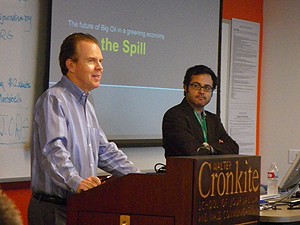Angel Gonzalez, who in recent weeks of his coverage for Dow Jones News Wires has flown over the BP oil spill by helicopter and ridden in boats with local officials, is the prototype for today’s global business journalist.
He is trilingual, he writes online, he writes for print, he does video and he has written a number of long stories on his BlackBerry. Whatever works at the time.
In today’s coverage, fluency in languages other than English and confidence in reporting with a variety of mediums makes a journalism graduate attractive to global business journalism organizations expanding their reach country by country. News bureaus in places like Shanghai and Dubai want bilingual reporters.
The “hottest” languages these days for journalists are Chinese and Arabic, since fluent speakers who can also write well in English are few and far between. But proficiency in a number of other languages can also be a selling point in a young journalist’s career. The importance of adding another language simply cannot be overstated to journalism students.
In Angel’s case, he grew up speaking Spanish in Venezuela. Then he became fluent in French, which led to his B.A. degree in Communications Studies in France at Universite Paris II. He then became fluent in English, receiving an M.A. in Journalism and Latin American Studies at the University of California Berkeley Graduate School of Journalism.
At Berkeley, I was his business journalism professor, where he turned in stories in English, in French and in Spanish. Who else but Angel could gave me an “extra credit” centerpiece story that was featured in Le Monde? His stories have also appeared the Buenos Aires Herald, El Pais in Spain and the Oakland Tribune. His investigative work with the Seattle Times led to a formal federal probe of a biotechnology firm.
Angel Gonzalez is the Houston bureau chief for Dow Jones Newswires, where he plays a key role in anchoring U.S. energy coverage. He was recently “deputized” by The Wall Street Journal to bolster its coverage of the BP spill. He blogged the hearings with BP top brass speaking before Congress as well.
He has extensive experience as a reporter covering the global oil and gas industry. He has tracked the fortunes of Big Oil and OPEC as well as the many harsh storms that routinely threaten the energy infrastructure along the Gulf Coast. Upcoming storms are of particular concern to the residents of the Gulf as they would disrupt clean-up efforts.
He has taken morning jogs with OPEC oil ministers and also covered hurricane season on the coast. His Spanish comes in handy in Latin America and his French helps when dealing with African nations. And, of course, he writes and edits in English.
If you google “BP oil spills” and “Angel Gonzalez” you will fill up many computer screens with just this year’s events. But you will also find his stories about the 2005 explosion at a BP refinery in Texas City that killed 15 people. And his story about the BP pipeline corrosion in 2006 that led to two oil spills in Prudhoe Bay in Alaska, the largest oilfield in the U.S., for which BP pleaded guilty to a criminal misdemeanor in 2007. All part of a wide-ranging settlement that included the Texas City, Texas, blast and allegations of manipulations in the propane industry.
Oil is an obvious international topic, but just about everything is wrapping around the globe these days.
For example, Carolina Madrid, an ASU Cronkite School student who is interning in the Thomson Reuters Los Angeles bureau this summer, is covering entertainment business stories that cross cultures. She grew up in Nogales, Ariz., and is fluent in Spanish, which helped her land the summer opportunity. A lengthy interview in Spanish before being selected served to underscore her language ability for her summer employer.
Advice to students and journalists: Fluency in a second language is a tremendous career boost and being able to handle three languages even better. Writing and speaking another language at a journalistic level is not easy, but that coupled with business knowledge assures that you will be an impressive job candidate throughout your career.










